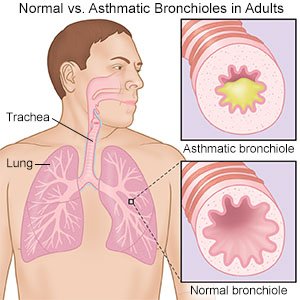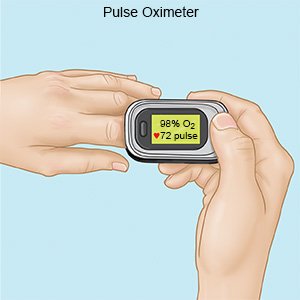Moderate and Severe Persistent Asthma
Medically reviewed by Drugs.com. Last updated on Aug 4, 2025.
What is moderate or severe persistent asthma?
Moderate or severe persistent asthma means you have asthma symptoms every day. You may also need to use your rescue inhaler daily to treat shortness of breath. Your normal activities are affected by wheezing, shortness of breath, or chest tightness. You have frequent flare-ups when your symptoms become worse. Flare-ups at night can affect your sleep and happen at least 1 time each week.
 |
What increases my risk for persistent asthma?
- Allergies
- Incorrect use of medicines, such as an inhaler
- Cigarette smoking or exposure to secondhand smoke
- Exposure to chemicals in the air
- Lung or sinus infections
How is persistent asthma diagnosed?
Your healthcare provider will examine you and listen to your lungs. He or she will ask if you or any family members have allergies. Your provider will want to know if you have any other health conditions. He or she will ask how often you have symptoms and what makes them worse. Tell him or her if your symptoms wake you at night or keep you from exercising. You may also need any of the following:
- A chest x-ray will help your doctor see if there is an infection or other problem with your lungs.
- Lung function tests , such as spirometry and peak expiratory flow rates, measure how well your lungs are working.
- Allergy testing can show if allergies to pollen, molds, dust mites, animal dander, or other items trigger your asthma.
How is persistent asthma treated?
Treatment may be changed to find the best way to manage your symptoms. Treatment may include any of the following:
- Medicines are given to decrease inflammation in your lungs, open your airways, and make it easier to breathe. The medicines may be inhaled, injected, or given as a pill. You may need medicine to relieve symptoms quickly and to prevent future attacks. Other medicines may be needed if your regular medicines are not able to prevent attacks.
- Allergy treatments , such as medicine or shots, may help control allergies that trigger your asthma.
Treatment options
The following list of medications are related to or used in the treatment of this condition.
Related medications
How do I know if my symptoms are controlled?
- You use your rescue inhaler less than 2 times in a week.
- You are able to do normal activities, including exercise.
- You are able to prevent emergency department visits.
- You are able to take your medicines with few or no side effects.
How can I manage persistent asthma?
- Check your oxygen level, if directed. Your healthcare provider may recommend you use a pulse oximeter (pulse ox). A pulse ox is a device that measures the amount of oxygen in your blood. You may be given an oxygen level goal for when you are at rest and another goal for activity.

- Follow your asthma action plan. This is a written plan that you and your doctor create. It explains which medicine you need and when to change doses if necessary. It also explains how you can monitor symptoms and use a peak flow meter. The meter measures how well air moves out of your lungs.
- Identify and avoid triggers. Keep your home free of pets, dust mites, cockroaches, and mold.
- Manage other health conditions , such as allergies, sinus problems, sleep apnea, or acid reflux.
- Do not smoke, and avoid others who smoke. Nicotine and other chemicals in cigarettes and cigars can cause lung damage. Ask your doctor for information if you currently smoke and need help to quit. E-cigarettes or smokeless tobacco still contain nicotine. Talk to your doctor before you use these products.
- Ask about the flu vaccine. The flu can make your asthma worse. You may need a yearly flu shot.
Call your local emergency number (911 in the US) if:
- You have severe shortness of breath.
- The skin around your neck and ribs pulls in with each breath.
- Your peak flow numbers are in the red zone of your AAP.
When should I seek immediate care?
- You have shortness of breath, even after you take your short-term medicine as directed.
- Your lips or nails turn blue or gray.
When should I call my doctor?
- You run out of medicine before your next refill is due.
- Your symptoms get worse.
- You need to take more medicine than usual to control your symptoms.
- You have questions or concerns about your condition or care.
Care Agreement
You have the right to help plan your care. Learn about your health condition and how it may be treated. Discuss treatment options with your healthcare providers to decide what care you want to receive. You always have the right to refuse treatment. The above information is an educational aid only. It is not intended as medical advice for individual conditions or treatments. Talk to your doctor, nurse or pharmacist before following any medical regimen to see if it is safe and effective for you.© Copyright Merative 2025 Information is for End User's use only and may not be sold, redistributed or otherwise used for commercial purposes.
Learn more about Moderate and Severe Persistent Asthma
Treatment options
Care guides
- Asthma
- Asthma in Children
- COPD (Chronic Obstructive Pulmonary Disease)
- Exercise-Induced Bronchoconstriction
- Reactive Airways Disease
Symptoms and treatments
Medicine.com guides (external)
Further information
Always consult your healthcare provider to ensure the information displayed on this page applies to your personal circumstances.
